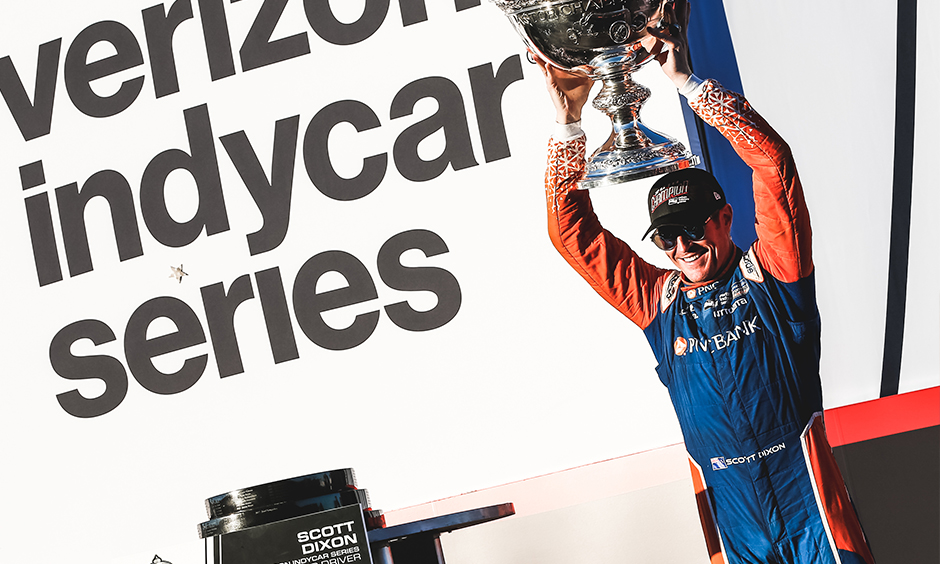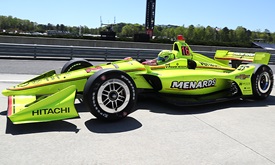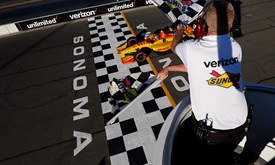INDYCAR's top 10 stories of 2018: Part 3
DEC 31, 2018
The past year brought a number of surprising and inspiring moments and story lines in racing, a season that showcased and embraced drama, strategy, a transformational change and monumental accomplishments.
Part 1: Powered by Honda
Part 2: From sea to shining Rossi
In no particular order, here are the final of three installments in IndyCar.com’s Ten Best Things about the 2018 Verizon IndyCar Series season:

Will Power’s reaction to winning the Indy 500: To understand what winning the 102nd Indianapolis 500 meant to Will Power, do a Google image search for “Will Power Indy 500 crazy eyes.” You will not be disappointed.
That look as he climbed from the car – part exultation, part relief and all forms of bonkers – was the perfect reaction to victory. It’s the level of passion fans want to see from racers, and Power’s passion for racing knows no limits.
For this victory, though, he needed to be perfect. He couldn’t miss a step, and he didn’t. That night, he couldn’t sleep.
“Usually you do that when you have a bad day,” Power said the day after the race. “You replay it, replay it. This is probably the first time I didn't even think about the race. Like, normally you do something wrong in a race (and think), ‘I could have done that better.’ This was the perfect day. No mistakes from me, no mistakes on pit lane. Just as good as it gets.”
In 2009, Power was injured while in a part-time ride for Team Penske. It wasn’t clear at the time if Power would return, but he did – and he’s made the most of it. Since then, Power has won 31 races and a Verizon IndyCar Series championship in 2014. But nothing is as good as winning Indy.
“(It’s) such a weight off of my shoulders,” Power said. “I don't have to have those questions anymore about what it would mean to win the Indy 500. Now I know. Can't put it into words.”
His team owner, who extended his record of Indy 500 victories to 17, did put it into words.
“He won this race today because he was the best,” Roger Penske said.
And when he won it, Power celebrated like every racer should. No need to be cool. Go nuts, man.
“That is exactly how you should do it,” fellow driver Conor Daly said at the Indianapolis 500 Victory Celebration. “Look like a total psychopath getting out of that car. That is exactly what it means."

The gift of Robert Wickens’ positive outlook: Whether he’s racing wheelchairs through hospital corridors or sharing the difficulties of his rehab routine, Robert Wickens has given family, friends and his fellow racers an inspiration that’s nearly impossible to express.
For fans, though, it’s easy. When Wickens went to the emergency room in December for treatment of streptococcus, he broke the news on Twitter, which responded with a group hug, including this from @AarynNC:
You’re a true inspiration Robbie. To watch your progression and honesty throughout this process is amazing. Wishing you and your family a Merry Christmas!! Wishing for more progress in 2019 and beyond. Thank you for taking the time to share your journey.
— Aaryn (@AarynNC) December 25, 2018
Instead of being private about the spinal cord injury he sustained at Pocono Raceway in August, Wickens went public, sharing his daily struggles, accomplishments and humor with friends (and complete strangers) via social media:
Got myself a tree! I figured it’s time to get into the Christmas spirit! It’s a very real tree and my arms are itchy to prove it! 🎄 pic.twitter.com/vkpD2xnEqk
— Robert Wickens (@robertwickens) November 15, 2018
And, of course, there was this hallway duel with teammate and long-time friend James Hinchcliffe:
I guess I’ll never get be Tom Cruise as long as @hinchtown is around... Edit by @itskarliwoods #daysofthunder #RowdyBurns #hospitallife #ehteam pic.twitter.com/w01rKANlBa
— Robert Wickens (@robertwickens) December 2, 2018
Perhaps more than anyone, Wickens has helped his Schmidt Peterson Motorsports co-workers, who took to him immediately after he joined the team before the season and were devastated by the crash.
“Everybody is a racer,” team co-owner Sam Schmidt said the day after the crash. “For every mechanic and every engineer, it’s a job and they get paid, but at the same time it’s more than that to them. You have to be a racer to be involved in it. When you see a driver like Robby that’s as committed and focused and relentless and driven – all of those adjectives describe Robby – it raises the level of the guys around him. You become more attached than normal.”
They aren’t the only ones feeling that way. Here’s to Wickens’ continued recovery in 2019.

Scott Dixon’s greatness: Nobody actually needs to be told that Scott Dixon is the best of his era, but he managed to remind us again this year with the fifth INDYCAR championship of his career.
This championship, while expected coming into the season finale at Sonoma Raceway, wasn’t certain – at least in Dixon’s mind – until he rounded the final turn and saw the checkered flag.
“It’s so weird,” Dixon said afterward. “You kind of always doubt the situation that you’re in, or at least I have, and there have been years when we’ve lost championships to sometimes silly things or sometimes where we just haven’t executed well. The whole race, I was just thinking about things that were out of our control or cautions that were going to flip the field, and none of that happened.”
Along with championships won in 2003, 2008, 2013 and 2015, the fifth title broke a tie with Dario Franchitti, Mario Andretti and Sebastien Bourdais and put Dixon alone in second place all time, trailing only A.J. Foyt’s seven championships. He’s also third behind only Foyt and Andretti in career wins, with 44.
Translation? Dixon isn’t just good. He’s great. And his greatness comes from his ability to change.
“He’s a chameleon,” Franchitti said of his friend. “He adapts to different styles of cars and different styles of tires. He learns from every teammate he’s got. He uses every resource he can get, and he’ll ask questions of them. You see the results.”
Racing consistently under changing circumstances and against close competition impresses those who see Dixon do it race after race.
“To do that in this era of racing with (car and engine) reliability the way it is, the evenness and competitiveness of teams, is unbelievable,” said Ryan Hunter-Reay of Andretti Autosport. “It's unthinkable what he's accomplished. It's amazing to think of what he's accomplished. It's great to share the track with him. Even better to beat him at times.”



















